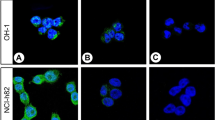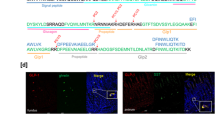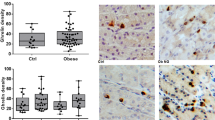Abstract
Human colorectal cancer tissue and matched uninvolved mucosa from 21 patients were examined by radioligand displacement for the presence of binding sites for bombesin-like peptides. Five cancers, but no uninvolved mucosa, expressed high-affinity, low-capacity bombesin binding sites (Kd = 6.53 nM, Bmax = 58.6 fmol mg-1 protein) of the gastrin-releasing peptide (GRP)-preferring subtype (IC50 4.8 nM). Bombesin-like peptides may have a role in the pathogenesis of colorectal cancer, and bombesin receptor antagonists may be of value in the treatment of receptor-positive tumours.
This is a preview of subscription content, access via your institution
Access options
Subscribe to this journal
Receive 24 print issues and online access
$259.00 per year
only $10.79 per issue
Buy this article
- Purchase on Springer Link
- Instant access to full article PDF
Prices may be subject to local taxes which are calculated during checkout
Similar content being viewed by others
Author information
Authors and Affiliations
Rights and permissions
About this article
Cite this article
Preston, S., Woodhouse, L., Jones-Blackett, S. et al. High-affinity binding sites for gastrin-releasing peptide on human colorectal cancer tissue but not uninvolved mucosa. Br J Cancer 71, 1087–1089 (1995). https://doi.org/10.1038/bjc.1995.210
Issue Date:
DOI: https://doi.org/10.1038/bjc.1995.210
This article is cited by
-
Unnatural amino acid substitutions to improve in vivo stability and tumor uptake of 68Ga-labeled GRPR-targeted TacBOMB2 derivatives for cancer imaging with positron emission tomography
EJNMMI Radiopharmacy and Chemistry (2024)
-
Synthesis and evaluation of a new bombesin analog labeled with 99mTc as a GRP receptor imaging agent
Journal of Radioanalytical and Nuclear Chemistry (2011)
-
In vitro binding evaluation of 177Lu-AMBA, a novel 177Lu-labeled GRP-R agonist for systemic radiotherapy in human tissues
Clinical & Experimental Metastasis (2009)
-
Synergistic Regulation of COX-2 Expression by Bombesin and Transforming Growth Factor-β
Digestive Diseases and Sciences (2008)
-
Bombesin induces cyclooxygenase-2 expression through the activation of the nuclear factor of activated T cells and enhances cell migration in Caco-2 colon carcinoma cells
Oncogene (2007)



